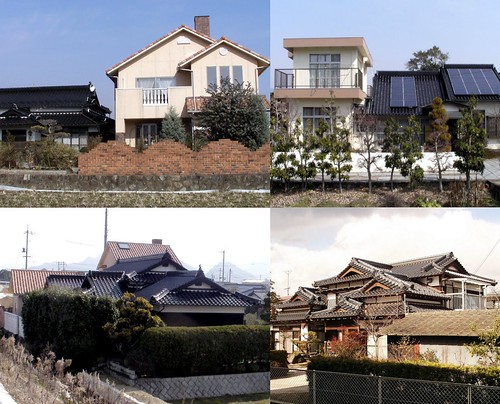Friday, February 24, 2012
Individualistic Japanese Architecture
Japanese cities (and most cities in East Asia) are a jumble of Western, Asian, traditional, modern, baroque, and just plain weird architectural styles. Planning regulations are lax and mainly concerned with ensuring the safety of the occupants, not with ensuring harmony with the surrounding buildings.
Cultural psychologists (Miyamoto, Nisbett, & Masuda, 2005) have associated Asian urban enviroments with purported Asian collectivism by arguing that Asian cities are diffuse, anonymous, lacking in a focal point, and encourage Asian wholistic modes of thinking.
Be that as it may, it seems to me that Japanese architecture both traditional and modern is 'ruggedly individualistic'. Traditional Japanese architecture, while belonging to a tradition, is often extravagent or even ostentatious in for instance the style of its rooves, gatehouses and entrance halls. More modern articture often, or usually, displays no concern for harmony with the surrounding architecture.
The Japanese are harmonious in regard to the expression of opinions in public sitations. Opinions are to be kept to oneself in Japan. Visual expressions of one ones preferences, proclivities, style, tastes, creativity, are often individual to the point of being obtrusive.
But then again, perhaps, there is nothing obtrusive about Japanese architecture at all. Japanese consider individualistic architectual preferences a common-place. And to a certain exten the individualities of Westerners and Asians are invisible to each other. Though Westerners have original opinions that are they are keen to expound, opinions, theories, policies and linguistic contrusctions in general are trivialised, or even, in the Zen Buddhist tradition especially, but also in common idiom (理屈言うな), perjorative. Similar visual expressions of individuality appear to Western eyes as trivial, mere image, peacocky, or vain. Sometimes it is difficult to see how individual we all are.
取り下げご希望がありましたら下記のコメント欄あるいはnihonbunka.comのメールリンクからご連絡ください
Cultural psychologists (Miyamoto, Nisbett, & Masuda, 2005) have associated Asian urban enviroments with purported Asian collectivism by arguing that Asian cities are diffuse, anonymous, lacking in a focal point, and encourage Asian wholistic modes of thinking.
Be that as it may, it seems to me that Japanese architecture both traditional and modern is 'ruggedly individualistic'. Traditional Japanese architecture, while belonging to a tradition, is often extravagent or even ostentatious in for instance the style of its rooves, gatehouses and entrance halls. More modern articture often, or usually, displays no concern for harmony with the surrounding architecture.
The Japanese are harmonious in regard to the expression of opinions in public sitations. Opinions are to be kept to oneself in Japan. Visual expressions of one ones preferences, proclivities, style, tastes, creativity, are often individual to the point of being obtrusive.
But then again, perhaps, there is nothing obtrusive about Japanese architecture at all. Japanese consider individualistic architectual preferences a common-place. And to a certain exten the individualities of Westerners and Asians are invisible to each other. Though Westerners have original opinions that are they are keen to expound, opinions, theories, policies and linguistic contrusctions in general are trivialised, or even, in the Zen Buddhist tradition especially, but also in common idiom (理屈言うな), perjorative. Similar visual expressions of individuality appear to Western eyes as trivial, mere image, peacocky, or vain. Sometimes it is difficult to see how individual we all are.
取り下げご希望がありましたら下記のコメント欄あるいはnihonbunka.comのメールリンクからご連絡ください
Labels: collectivism, individualism, japan, japanese culture, 個人主義, 日本文化, 集団主義
This blog represents the opinions of the author, Timothy Takemoto, and not the opinions of his employer.

